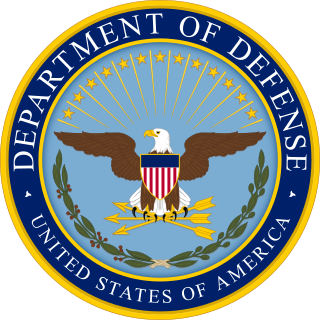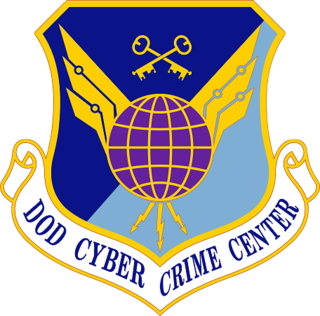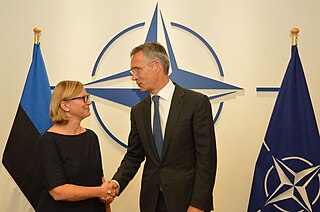
Computer security is the protection of computer software, systems and networks from threats that may result in unauthorized information disclosure, theft of hardware, software, or data, as well as from the disruption or misdirection of the services they provide.

National security, or national defence, is the security and defence of a sovereign state, including its citizens, economy, and institutions, which is regarded as a duty of government. Originally conceived as protection against military attack, national security is widely understood to include also non-military dimensions, such as the security from terrorism, minimization of crime, economic security, energy security, environmental security, food security, and cyber-security. Similarly, national security risks include, in addition to the actions of other nation states, action by violent non-state actors, by narcotic cartels, organized crime, by multinational corporations, and also the effects of natural disasters.
Cyberterrorism is the use of the Internet to conduct violent acts that result in, or threaten, the loss of life or significant bodily harm, in order to achieve political or ideological gains through threat or intimidation. Emerging alongside the development of information technology, cyberterrorism involves acts of deliberate, large-scale disruption of computer networks, especially of personal computers attached to the Internet by means of tools such as computer viruses, computer worms, phishing, malicious software, hardware methods, and programming scripts can all be forms of internet terrorism. Some authors opt for a very narrow definition of cyberterrorism, relating to deployment by known terrorist organizations of disruption attacks against information systems for the primary purpose of creating alarm, panic, or physical disruption. Other authors prefer a broader definition, which includes cybercrime. Participating in a cyberattack affects the terror threat perception, even if it isn't done with a violent approach. By some definitions, it might be difficult to distinguish which instances of online activities are cyberterrorism or cybercrime.

Allied Command Transformation (ACT) is a military command of the North Atlantic Treaty Organization (NATO), formed in 2003 after restructuring.

Cyberwarfare is the use of cyber attacks against an enemy state, causing comparable harm to actual warfare and/or disrupting vital computer systems. Some intended outcomes could be espionage, sabotage, propaganda, manipulation or economic warfare.

The United States under secretary of defense for policy (USDP) is a high level civilian official in the United States Department of Defense. The under secretary of defense for policy is the principal staff assistant and adviser to both the secretary of defense and the deputy secretary of defense for all matters concerning the formation of national security and defense policy.

The Estonian Navy are the unified naval forces among the Estonian Defence Forces.
Beginning on 27 April 2007, a series of cyberattacks targeted websites of Estonian organizations, including Estonian parliament, banks, ministries, newspapers and broadcasters, amid the country's disagreement with Russia about the relocation of the Bronze Soldier of Tallinn, an elaborate Soviet-era grave marker, as well as war graves in Tallinn. Most of the attacks that had any influence on the general public were distributed denial of service type attacks ranging from single individuals using various methods like ping floods to expensive rentals of botnets usually used for spam distribution. Spamming of bigger news portals commentaries and defacements including that of the Estonian Reform Party website also occurred. Research has also shown that large conflicts took place to edit the English-language version of the Bronze Soldier's Wikipedia page.

NATO CCD COE, officially the NATO Cooperative Cyber Defence Centre of Excellence, is one of NATO Centres of Excellence, located in Tallinn, Estonia. The centre was established on 14 May 2008, it received full accreditation by NATO and attained the status of International Military Organisation on 28 October 2008. NATO Cooperative Cyber Defence Centre of Excellence is an international military organisation with a mission to enhance the capability, cooperation and information sharing among NATO, its member nations and partners in cyber defence by virtue of education, research and development, lessons learned and consultation.

The Department of Defense Cyber Crime Center (DC3) is designated as a Federal Cyber Center by National Security Presidential Directive 54/Homeland Security Presidential Directive 23, as a Department of Defense (DoD) Center Of Excellence for Digital and Multimedia (D/MM) forensics by DoD Directive 5505.13E, and serves as the operational focal point for the Defense Industrial Base (DIB) Cybersecurity program. DC3 operates as a Field Operating Agency (FOA) under the Inspector General of the Department of the Air Force.
Cyberwarfare is the use of computer technology to disrupt the activities of a state or organization, especially the deliberate attacking of information systems for strategic or military purposes. As a major developed economy, the United States is highly dependent on the Internet and therefore greatly exposed to cyber attacks. At the same time, the United States has substantial capabilities in both defense and power projection thanks to comparatively advanced technology and a large military budget. Cyber warfare presents a growing threat to physical systems and infrastructures that are linked to the internet. Malicious hacking from domestic or foreign enemies remains a constant threat to the United States. In response to these growing threats, the United States has developed significant cyber capabilities.
The Estonian Defence League’s Cyber Unit is a group of units within certain malevs of the Estonian Defense League established in 2010. Created out of inspiration from the 2007 cyberattacks on Estonia and spearheaded by Informatics Scientist Ülo Jaaksoo, it focuses on the defense of the Estonian state and private telecommunications infrastructure from outside-derived cyberattacks, and mostly employs the volunteer participation of IT professionals.
The 2011 U.S. Department of Defense Strategy for Operating in Cyberspace is a formal assessment of the challenges and opportunities inherent in increasing reliance on cyberspace for military, intelligence, and business operations. Although the complete document is classified and 40 pages long, this 19 page summary was released in July 2011 and explores the strategic context of cyberspace before describing five “strategic initiatives” to set a strategic approach for DoDʼs cyber mission.

The NATO Communications and Information Agency is NATO's technology and cyber hub.
The Partnership for Peace Consortium is a network of over 800 defense academies and security studies institutes across 60 countries. Founded in 1998 during the NATO Summit, the PfPC was chartered to promote defense institution building and foster regional stability through multinational education and research, which the PfPC accomplishes via a network of educators and researchers. It is based at the George C. Marshall European Center for Security Studies in Garmisch-Partenkirchen, Germany. According to the PfPC Annual Report of 2012, in 2012 eight hundred defense academies and security studies institutes in 59 countries worked with the PfPC in 69 defense education/defense institution building and policy-relevant events. The Consortium publishes an academic quarterly journal CONNECTIONS in English and Russian. The journal is run by an international Editorial Board of experts and is distributed to over 1,000 institutions in 54 countries.

Enhanced Forward Presence (EFP) is a NATO-allied forward-deployed defense and deterrence military force in Northern, Central and Eastern Europe. This posture in Northern Europe through Estonia, Latvia, and Lithuania and in Central Europe through Poland, Slovakia and Hungary and in Eastern Europe through Romania and Bulgaria, is in place to protect and reassure the security of NATO's Northern, Central and Eastern European member states on NATO's eastern flank.

Robert Peter Bauer is an officer of the Royal Netherlands Navy who has been serving as Chair of the NATO Military Committee since June 2021, succeeding Air Chief Marshal Sir Stuart Peach of the Royal Air Force of the United Kingdom. He previously served as the Chief of Defence from October 2017 to April 2021, and as the Vice Chief of Defence of the Netherlands of the from 1 September 2015 to 13 July 2017. Bauer was also involved in counter-terrorist and anti-piracy operations in the Mediterranean Sea, and in the Horn of Africa.

The European Defence Fund (EDF) is a component of the European Union's (EU) Common Security and Defence Policy (CSDP) which aims to coordinate and increase national investment in defence research and improve interoperability between national armed forces. It was proposed in 2016 by Commission President Jean-Claude Juncker and established in 2017. The fund has two stands; Research and Development & Acquisition. In July 2018, the European Commission announced that the EDF budget for 2021-2027 would be €13 billion. This sum was later revised by the European Commission as part of the new EU budget proposed on May 27, 2020, as a result of the COVID-19 pandemic, according to which the EDF will be allocated €8 billion over this budget period.

Since Estonia joined NATO in 2004, Estonia has participated in many joint military operations using its Estonian Defence Forces. Estonia has also participated in NATO-led military and peacekeeping operations before 2004.












